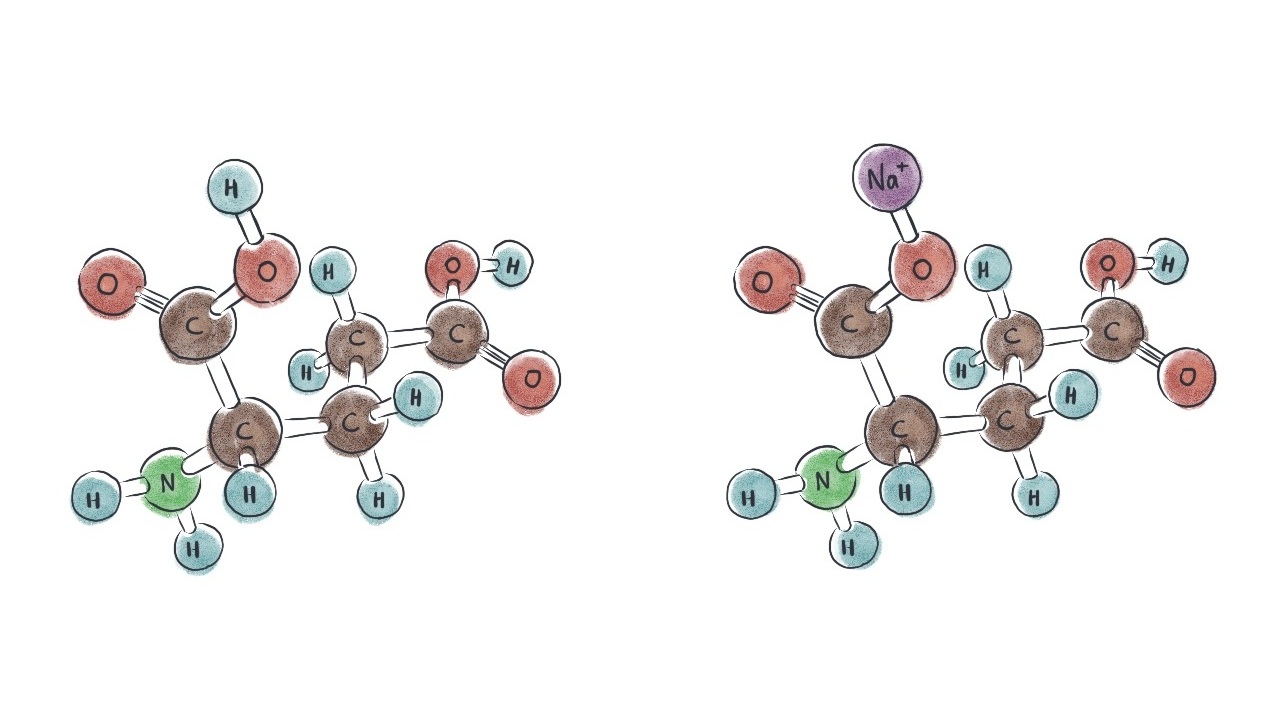Demystifying MSG
Author: Fiona Lu
Illustrator: Qingfeng Chai
Everyone has heard to stay far away from MSG, but no one knows exactly why. These days, with the media being flooded by food myths, it can be easy to write off every non-organic food item as toxic and cancer-inducing with MSG being at the forefront of things to stay away from.
But is this “dehydrating, headache-inducing, cancerous” chemical really as toxic as everyone claims?
MSG, or Monosodium Glutamate, is a flavor enhancer that makes foods taste more savory. The effects of MSG were first discovered by chemist Kikunae Ikeda in 1908 while he was studying the flavor-enhancing properties of seaweed commonly used to create “umami” in Japanese dishes.³ “Umami” (meaning delicious in Japanese) is one of the five basic tastes along with salty, bitter, sweet, and sour that is responsible for creating the mouth-watering effect of savory foods.¹ Ikeda discovered that the umami in seaweed came from an amino acid called L-glutamate which is common in many protein-rich foods such as meats, dairy, and certain vegetables. Our own bodies are also responsible for producing glutamate during digestive metabolism.¹
Monosodium glutamate just adds a sodium atom to glutamic acid in order to make it a salt that is easier to sprinkle over dishes, and consequently easier for the body to absorb since it is not bound by proteins.² So how can something so common in natural foods and biological processes be so toxic? Well, it turns out the myth began with a letter to the New England Journal of Medicine in 1968 describing the thirsty, nauseating, headaches felt after eating Chinese food. The letter was written by a Chinese physician named Kwok who coined the symptoms as the “Chinese Restaurant Effect” and suggested that MSG was to blame. Scientific research following this letter concluded that MSG can cause certain individuals to experience these symptoms when it is consumed in large quantities on an empty stomach; however, it is safe for most people.² The headaches you experience after eating MSG-rich foods are caused because glutamic acid is an excitatory neurotransmitter that stimulates nerve cells in the brain in order to relay its signal. Excessive L-glutamate in the brain induces excessive nerve cell stimulation which can lead to headaches, muscle tightness, and nausea. When taken in average amounts (.55-.58 grams daily intake in the U.S.), there is no harm, though certain groups have a higher sensitivity to glutamate.¹
Unfortunately, MSG’s bad reputation continued to be spread despite the fact that both the World Health Organization and FDA deemed it to be a completely safe ingredient, when taken in moderation like all things.²
So what is the takeaway from this article? MSG is a common amino acid found in most proteins and does not lead to any health damage, but if you feel sick after consuming it then it probably just means you are taking too much and should cut down on savory foods. Since savory foods are heavily processed and contain many other additives, you should limit your consumption of them anyway and stick to getting your glutamate intake from natural whole foods.
References:
1. Leech, Joe. “MSG (Monosodium Glutamate): Good or Bad?” Healthline, Healthline Media, 19 Nov. 2018, www.healthline.com/nutrition/msg-good-or-bad.
2. Mercola, Joseph. “MSG Is This Silent Killer Lurking in Your Kitchen Cabinets.” Mercola.com, Mercola, 21 Apr. 2009, articles.mercola.com/sites/articles/archive/2009/04/21/msg-is-this-silent-killer-lurking-in-your-kitchen-cabinets.aspx.


